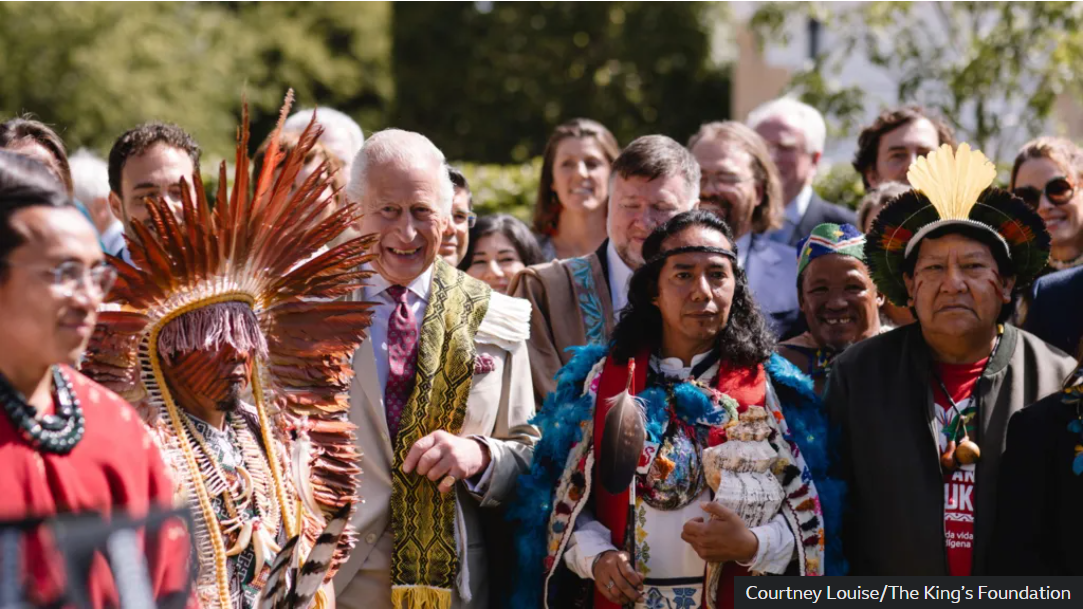Mere Takoko
Ngāti Porou, Rongowhakaata, Te Whānau-a-Apanui, Waikato
Tonganui Scholarship Recipient 2024
Mere’s continued PhD research seeks to unlock the potential of whale conservation and blue carbon habitat restoration as part of a large-scale trophic rewilding project across the Polynesian triangle.
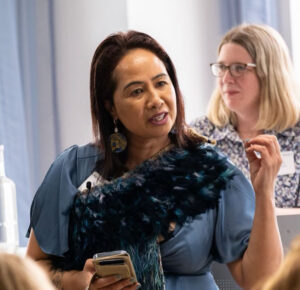 Mere’s moemoeā…
Mere’s moemoeā…
He Whakaputanga Moana: Unlocking the Ocean’s Potential for Indigenous Communities
My vision is a Pacific where whales (tohorā) and other taonga moana flourish alongside empowered Indigenous Peoples and Local Communities (IPLCs). Guided by ancestral wisdom and empowered by science, IPLC’s will lead the sustainable management of their ocean resources. The He Whakaputanga Moana Ocean Declaration, which confers legal personhood upon whales, will serve as a cornerstone in achieving this vision. My PhD research aims to help unlock the potential of whale conservation and blue carbon habitat restoration as part of a large-scale trophic rewilding project across the Polynesian triangle, providing a pathway for IPLC’s to create a sustainable future where both people and the planet thrive.
This funding will enable me to extend my PhD research period by six months, providing critical time to advance the following:
- Global Collaboration: Deepening engagement with King Charles III’s climate initiative, the Circular Bioeconomy Alliance, and the HRH Princess Reema of Saudi Arabia, showcasing Pacific leadership on the world stage and fostering international cooperation on blue carbon solutions.
- Whale Legal Personhood Pilot Projects: Designing innovative, Indigenous-led projects in partnership with Simmons & Simmons (UK) and Ocean Vision Legal (USA) that demonstrate the potential of recognizing whales’ legal rights, aligning with my PhD research.
- Produce a feature-length documentary that will showcase the whale legal personhood project, highlighting the role of traditional Polynesian voyaging in ocean conservation.
Kaupapa update from Mere
Please provide an overview of your project
My PhD was retitled, “Moananui Ki Tai: A Model for Indigenous-Led Whale Conservation and Nature Based Solutions,” explores how Indigenous knowledge can fundamentally reshape ocean conservation. As a descendant of Māui and Paikea from Ngāti Ruawaipū, my work directly supports the Tonganui Scholarship’s vision for advancing mātauranga Māori within the oceans sector.
This research confronts the Pacific’s escalating biodiversity crisis, highlighting the devastating legacy of industrial whaling. It proposes the “Moananui Ki Tai” framework, a transformative, Indigenous-led paradigm rooted in Polynesian cosmology and Ngāti Ruawaipū’s deep kinship with the ocean. This action-based study aims to guide Nature-based Solutions (NbS) across the Pacific, fostering ethical nature markets and regenerative blue economies.
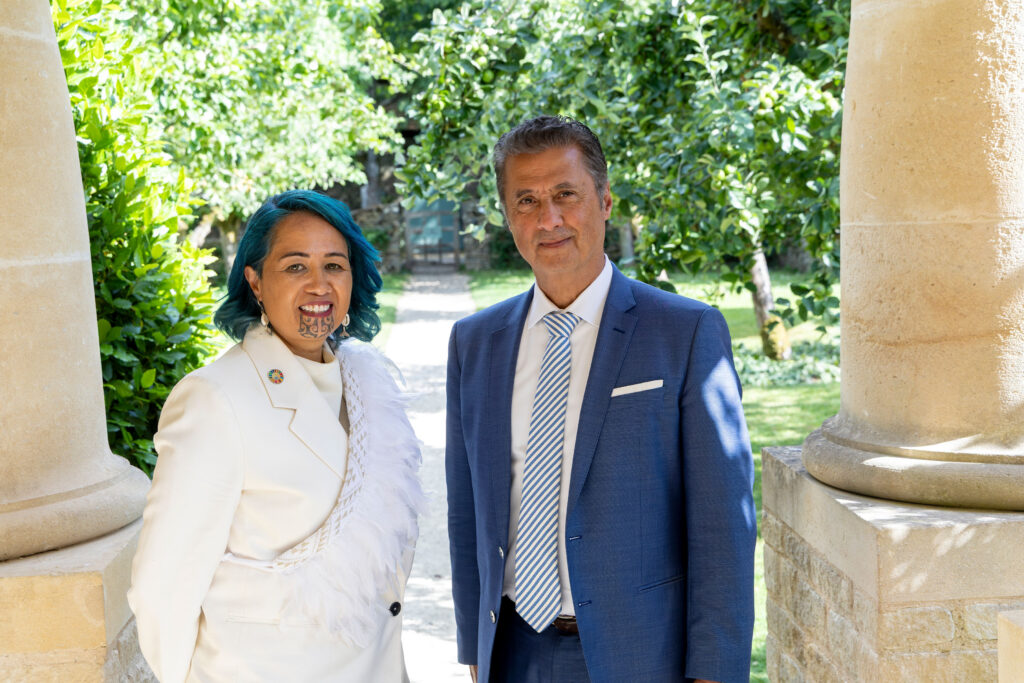
Mere Takoko & Dr. Ralph Chami at the 2025 King’s Foundation summit at Highgrove in Gloucestershire.
Key initiatives integrate mātauranga Māori with Western science, advocating a “two-eyed seeing” approach. I’ve developed Rights of Nature instruments, including the pan-Pacific He Whakaputanga Moana Declaration and the Te Mana o Te Tohorā Bill, to establish legal personhood for whales. The Moananui Sanctuary Agreement envisions vast protected areas utilizing dynamic rāhui. Innovative finance mechanisms—like the Pacific Whale Fund, its $100 million Blue Resilience Bond, and the Indigenous-led Moananui Nature Standard™—are designed to underpin these efforts, championing Indigenous leadership and a shift from exploitation to coexistence.
My methodology is Kaupapa Māori, reflecting my active role. It blends Indigenous ways of knowing with legal, policy, and economic analysis, utilising wānanga and hui.
Ultimately, this research demonstrates how Indigenous frameworks, such as the Moananui Nature Standard™, pave the way for climate equity and economic sovereignty. It seeks to ignite global dialogue, forging legislative and financial pathways for a sustainable Pacific, empowering Māori communities, healing the ocean, and cultivating an “economy of aroha” grounded in ancestral wisdom and contemporary rigor.
Who did your project involve?
The journey of “Moananui Ki Tai” was never a solitary one; rather, it was written from the insights, dedication, and support of a diverse collective. At its heart, of course, lay my own commitment as the author and researcher, guided by the invaluable academic mentorship of Dr. Ocean Mercier.
This profound undertaking was significantly shaped by the pioneering minds of marine scientists and nature economists, notably Dr. Carlos Duarte and Dr. Ralph Chami, whose work on blue carbon and whale eco-services provided crucial scientific and economic foundations. Their counsel, alongside the vital legal expertise of Michelle Bender from Ocean Vision Legal and the strategic insights from many international colleagues, was instrumental in translating our vision into tangible frameworks like the He Whakaputanga Moana Declaration and the Te Mana o Te Tohorā Bill.
Crucially, the very essence of this project was forged through deep engagement with Indigenous leadership across Te Moananui-a-Kiwa. The late Māori King, Kiingi Tūheitia Potatau Te Wherowhero VII, stood as a paramount champion, lending immense weight to the He Whakaputanga Moana Declaration, which was further ratified by revered Ariki and Iwi leaders from Aotearoa, the Cook Islands, Tahiti, and Tonga, including figures like Tou Travel Ariki and Arikinui Joinville Pōmare. Our own Ngāti Ruawaipū tipuna and tōhunga, whose ancient wisdom forms the philosophical bedrock of the Moananui Ki Tai framework, were ever-present guides. This rich cultural tapestry was further enriched by the insights of spiritual leaders such as Rangimarie Rose Pere, and the practical contributions of Indigenous experts like Rahui Papa, who ensured our engagements remained rooted in tikanga.
The project found its operational platforms through the crucial support of various Houses of Ariki, including the House of Tupou, and it gained global momentum through the action-based initiatives of the Pacific Whale Fund, with its innovative Moananui blue bond initiative. Legal firms Simmons & Simmons and Ocean Vision Legal provided invaluable pro-bono support, and numerous international collaborators from various continents contributed their expertise in workshops and discussions. This collective endeavour, spanning ancestral wisdom, scientific inquiry, legal innovation, and global partnership, truly brought “Moananui Ki Tai” to fruition.
What were the major outcomes of this kaupapa?
Since receiving my funding scholarship last year, the “Moananui Ki Tai” project has seen a profound acceleration of its vision, marked by a series of globally significant accomplishments, unfolding chronologically from late 2024 into 2025.
In addition to strengthening relationships with the Houses of Ariki in Tahiti and Tonga, a foundational moment occurred in November 2024, when I was officially announced as the first Indigenous Pacific ambassador to King Charles’ Circular Bioeconomy Alliance (CBA) in London.
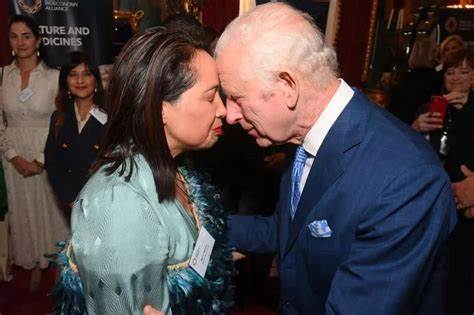
Mere Takoko and King Charles sharing hōngi
This significant engagement, where I performed the hongi with His Majesty, established a powerful bridge between ancient wisdom and contemporary solutions, setting the stage for deeper collaborations.
As 2025 commenced, our efforts gained significant momentum. The Te Mana o Te Tohorā Bill (2025), a crucial legislative framework designed to translate the inherent rights of whales into tangible legal standards, was developed. This period culminated in a major academic milestone: I successfully submitted my PhD thesis, “Moananui Ki Tai: A Model for Indigenous-Led Whale Conservation and Nature Based Solutions,” at the end of June 2025, the very work for which this scholarship provided essential support. My final oral examination is now scheduled for September.
Immediately following this submission, a monumental announcement was made at the Third United Nations Ocean Conference (UNOC3), held from in July, 2025, in Nice, France. There, Princess Angelika Latufuipeka Tuku’aho of Tonga publicly declared Tonga’s intention to pass the Mafai ʻo e Tofuaʻa Whale Legal Personhood Act 2025. This commitment sets an unprecedented international precedent, solidifying Tonga’s leadership in ocean conservation and asserting our right to manage marine resources through a cultural lens.
At UNOC3, our presence was robust, with three key events held to amplify our message. Beyond these, as a member of the One Ocean Science Congress, I was nominated to submit the 10 scientific recommendations representing 2000 ocean scientists to Heads of State, including President Macron (France). This critical presentation, broadcasted to international audiences, powerfully called for the rights of nature for all marine life, specifically advocating for legal personhood for whales. Our collective voice was further strengthened by the overwhelming support of the global community, with just under 450,000 people signing our petition for legal personhood for whales.
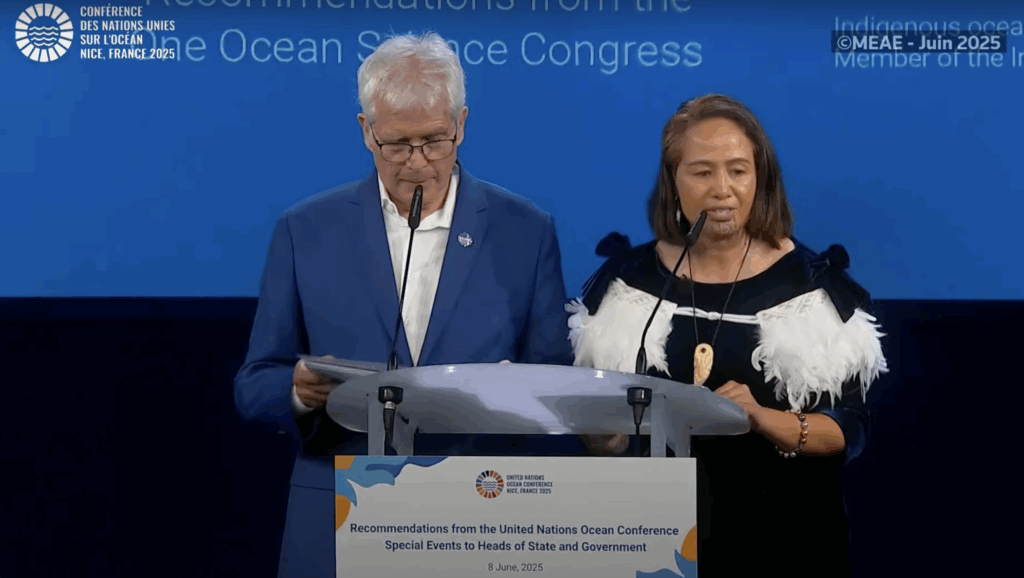
My engagement with global leaders continued, including recent participation in the Harmony Summit in London alongside King Charles, building on our established relationship. My extensive travel throughout Europe this year has included a crucial trip to Seville, Spain, for the Fourth International Conference on Financing for Development (FfD4), a significant UN finance conference held from June 30 to July 3, 2025. Further visits to France, England, and Norway have allowed us to forge vital international partnerships. My voice has also resonated through various BBC news appearances, with an upcoming podcast further extending our reach.
Financially, the Pacific Whale Fund has launched the Living Oceans Fund with a commitment to raise £100 million, providing crucial capital to underpin the ambitious Moananui Sanctuary and its goals. Furthermore, the project is now in production for the documentary “Deep Code” with our Norwegian partners, bringing this vital narrative to a wider audience. These collective accomplishments underscore the project’s ability to translate Indigenous vision into impactful, real-world change on a global scale.
What were some of the challenges your kaupapa faced during its implementation?
The path of implementing “Moananui Ki Tai” – both as a rigorous PhD study and through its real-world application – has been far from without its complexities, a journey marked by both profound insights and persistent obstacles. Translating a vision rooted in ancestral wisdom into actionable global initiatives, whilst simultaneously undertaking doctoral research, demanded navigating intricate and often challenging terrain.
One significant hurdle lay in bridging the epistemological divide between Indigenous knowledge systems and Western academic and policy paradigms. Within the context of my PhD, this meant constantly striving to ensure that mātauranga Māori was not merely acknowledged but genuinely integrated as a foundational, equally valid knowledge system alongside Western science. This required navigating academic expectations whilst advocating for research methodologies that honoured tikanga and Indigenous ways of knowing. Simultaneously, in the practical implementation of the Moananui Ki Tai framework, we faced the challenge of translating these nuanced cultural principles into language and structures comprehensible to international policymakers, legal experts, and financial institutions. Ensuring that Indigenous voices held substantive influence, rather than being tokenised, demanded continuous effort and negotiation.
Furthermore, securing adequate and equitable financing for the large-scale initiatives that form the empirical backbone of my PhD presented a persistent challenge. Despite the compelling nature of our Indigenous-led solutions, the conventional nature finance system often proved resistant to re-imagining its structures. This effort has required immense personal sacrifice to maintain operational momentum for the Pacific Whale Fund and other initiatives like the Moananui Sanctuary. The inherent power imbalances within the finance sector meant constantly advocating for direct access to capital for Indigenous communities, countering the tendency for funds to be channeled through traditional, centralised institutions that often disregard Indigenous worldviews or risk exacerbating existing inequalities. The very concept of “nature markets,” whilst offering potential, also presented the obstacle of scepticism and the legacy of past failures, such as “phantom credits” and greenwashing, which necessitated a rigorous commitment to integrity and transparency in our own models.
Operational complexities also arose from the need to shift away from top-down corporate or NGO leadership models towards genuine Indigenous-led governance. This required fostering transparent communication and ensuring authentic, proactive participation from Indigenous partners across multiple nations, which often entailed significant personal travel and battling fatigue across continents. Ultimately, these encounters with entrenched systems and the inherent complexities of reconciling diverse worldviews served as huge learning experiences, reinforcing the critical importance of robust Indigenous governance, unwavering focus, and a steadfast commitment to equity in all our endeavours.
How did this kaupapa benefit from the Tonganui Scholarship?
The funds were primarily deployed to facilitate my presence and active participation in key international engagements. This included dedicated travel to Tahiti and Tonga, which was essential for strengthening vital, face-to-face relationships with the House of Ariki and other Indigenous leaders. These direct engagements were paramount to ensuring the authenticity and widespread endorsement of the Moananui Ki Tai framework and the He Whakaputanga Moana Declaration, as well as securing the commitment from Princess Angelika Latufuipeka Tuku’aho of Tonga for the Mafai ʻo e Tofuaʻa Whale Legal Personhood Act 2025. Such deep, personal connections, built on kanohi-ki-te-kanohi principles, are impossible to forge without the ability to travel and spend time in these communities.
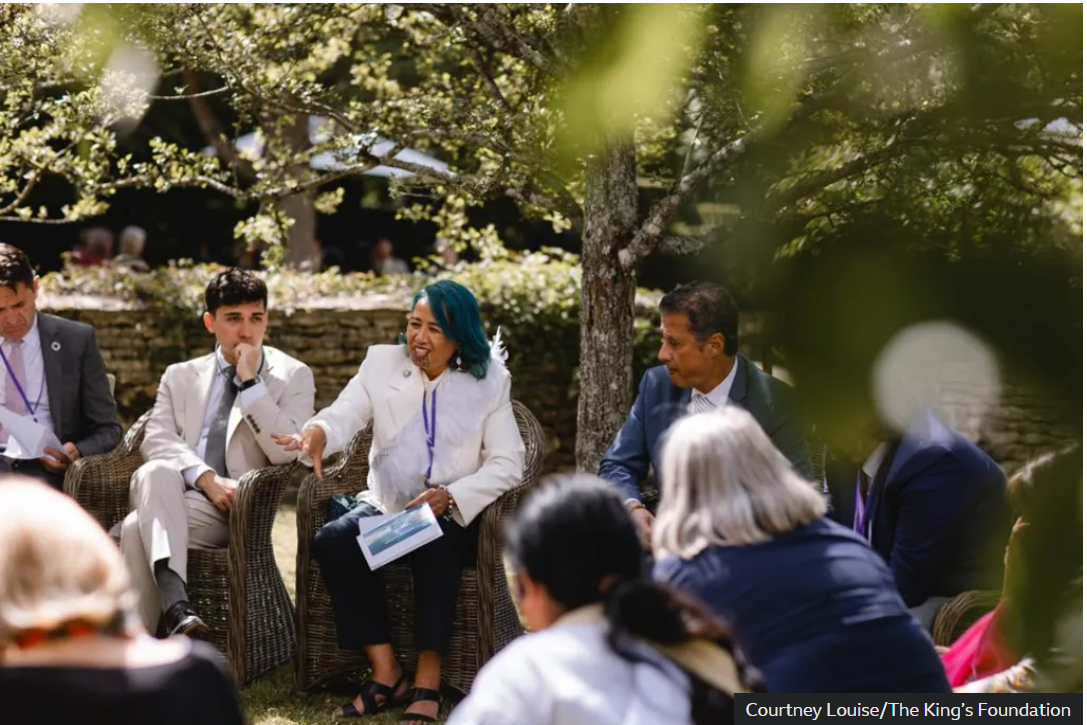
Crucially, the funding also assisted significantly with paying my academic fees, providing the essential financial stability that allowed me to dedicate myself fully to the demanding research and writing required for my PhD thesis. This direct support for my studies was foundational to the entire project’s success.
In essence, the funding provided the essential fuel for my academic pursuits and my vital work in Tahiti and Tonga, allowing me to bridge cultural divides, build critical relationships, and advance the Moananui Ki Tai vision. It was not merely financial assistance; it was the catalyst that transformed academic research into a living, impactful movement for ocean conservation and Indigenous self-determination.
What are your future plans for this kaupapa?
The “Moananui Ki Tai” kaupapa is far from concluded; it is a living, evolving journey that I am deeply committed to continuing. My hopes and dreams for this initiative stretch far beyond the pages of my recently submitted PhD thesis, envisioning a future where the principles I have articulated translate into widespread, tangible change across our oceans.
My ultimate dream for this kaupapa is to see a truly regenerative blue economy flourish, one where the intrinsic value of all marine life, particularly our tohorā, is not just recognised but legally enshrined and actively protected. I dream of a Pacific where Indigenous communities stand as empowered, self-determining guardians, their mātauranga guiding conservation efforts, and their voices central to all decisions affecting our ocean. This includes the widespread adoption of whale legal personhood, the establishment of the Moananui Sanctuary as a thriving reality, and the proliferation of ethical nature markets that genuinely benefit both nature and people, fostering an economy of aroha. I envision a future where the songs of the whales echo across healthy waters, a testament to a restored relationship between humanity and the moana.
However, the immediate path ahead, particularly over the next six months, will be a testing period. Whilst I am immensely heartened by a significant pledge from one of Norway’s largest NGOs, I am now working diligently to secure the £2.5 million needed to fully unlock our £100 million commitment and propel our initiatives forward. My focus right now is intensely directed towards securing short-term funding to bridge this crucial negotiation period, ensuring that the momentum we have built is not lost. Overcoming these financial hurdles is paramount to translating our shared dreams into enduring realities, allowing us to continue the vital work of healing our oceans and empowering our communities.
